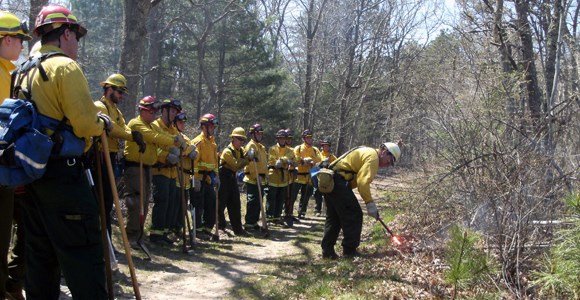Last updated: December 15, 2017
Article
Partnership Training Builds Community Wildland Fire Preparedness

Working with the local communities near Cape Cod National Seashore is vital to creating strong preparedness capability for wildland fire at the park. In spring 2012, David Crary, Jr., fire management officer at Cape Cod National Seashore, partnered with the local volunteer fire department in West Barnstable, Massachusetts, AmeriCorps, an Explorer Scout group, and the Town of Barnstable Conservation Division to offer basic wildland firefighter S-130/S-190 training.
Crary’s advance planning and effective cross-jurisdictional/agency communication were key to multiple successes achieved through the training session.
The training included nine hours of S-130/S-190 classroom training over three nights to enhance the online 130/190 training, and an eight-hour Saturday prescribed burn field exercise. The classroom training was scheduled in the early evening and the prescribed burn on a Saturday so as many participants as possible could attend without missing their daily jobs. There was no charge to attend the training.
The prescribed burn field exercise, held at the West Barnstable Conservation Area, was planned to simulate an actual wildland fire incident. Training components of the field exercise included mobilizing to a staging area, hiking to the incident, deploying practice fire shelters, using ignition devices, practicing hose lays, and using a variety of tools for fireline construction and mop up. A formal after-action review concluded the field session. This training stressed the safe and efficient response of local and volunteer firefighters to wildland fires and provided leadership training opportunities for the Cape Cod National Seashore fire technicians who worked as squad bosses during the burn.
Darcy Karle, Barnstable conservation officer, said the prescribed burn fulfilled three objectives in the area’s fire management plan. First, the burn took place in a location identified as an area requiring prescribed fire treatment to create a firefighter and public safety zone. Second, the burn provided hands-on training for local firefighters, and third, more than 34 homes located in close proximity to the prescribed burn location benefited from the fuel break resulting from the treatment. Karle went on to say, “The Barnstable Conservation Division depends greatly on David Crary, the National Park Service crew, the West Barnstable Fire Department, and our DPW highway crew to assist us with protecting not only Barnstable residents, but Sandwich residents that abut our conservation area. We appreciate everyone’s hard work and dedication.”
Cape Cod AmeriCorps and West Barnstable Explorer Post 294 were among those who attended the training. In addition to the curriculum for S-130/S-190, participants learned about skill building, fire ecology, careers in fire management, and the importance of teamwork between individuals and agencies. But the most important message shared was that firefighter and public safety is the number one priority in firefighting and each person plays a role in safety. This type of hands-on, minds-on youth engagement meets the NPS Call to Action goals for providing civic engagement opportunities to build an engaged 21st-century workforce.
David Crary’s advanced planning with partners resulted in multiple successful outcomes that meet the goals and objectives of the Cohesive Strategy, the National Park Service, partners, and local communities. Crary commented that the outcome of the training was a win-win for all.
Contact: Barbara Dougan, Northeast Region fire communication specialist
Email: e-mail us
Phone: (508) 255-3421 x 16
